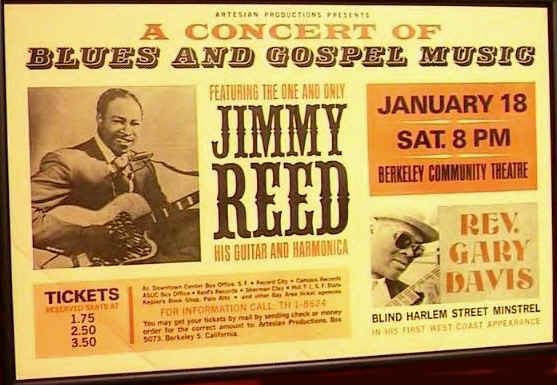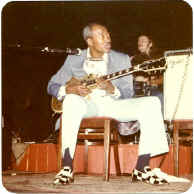The Jimmy
Reed Interview 1976
by Norman Davis
I was in the
production room at KSAN one evening, putting together a spot for an album before my show,
when I got a phone call from Wild Bill, a crazy DJ and good friend who worked at KTIM.
"Hey, you’ll never guess who’s in town!" He yelled. As we were in San
Francisco, the international crossroad for music and entertainment, my chances of guessing
right were about as good as my chances of getting on The Wheel. "Who could it
be?" I wondered. "Jimmy Reed!" Bill screamed delightedly.  There was a
short pause in my brain function. "Jimmy Reed’s alive?" I asked
incredulously. "Yeah, he’s in town to play at the Savoy-Tivoli and I’ve set
it up for you to do an interview," Bill bragged.
I was blown
away. For years I and quite a few others had assumed that Jimmy Reed was dead. It was 1976
and nobody had heard much about Jimmy for a decade or so. A couple of weak albums had come
out in the early ‘70s, but Jimmy had been out of the news for quite a while. I
thanked Bill profusely for the opportunity to meet one of my musical heroes and arranged
for the interview.
The production
room was already booked when Jimmy showed up at the station, so I took him down to the
basement where we talked for about an hour, surrounded by racks of old records and radio
equipment. Jimmy’s deep Delta dialect had me leaning forward in my chair most of the
time to hear every word. Jimmy talked about growing up in Mississippi; How he went to work
in the cotton fields as soon as he was big enough to handle a hoe, how he snuck up to the
house at lunch time to hear the King Biscuit Show with Sonny Boy Williamson on the radio
and how he built his first guitar.
There was a
short pause in my brain function. "Jimmy Reed’s alive?" I asked
incredulously. "Yeah, he’s in town to play at the Savoy-Tivoli and I’ve set
it up for you to do an interview," Bill bragged.
I was blown
away. For years I and quite a few others had assumed that Jimmy Reed was dead. It was 1976
and nobody had heard much about Jimmy for a decade or so. A couple of weak albums had come
out in the early ‘70s, but Jimmy had been out of the news for quite a while. I
thanked Bill profusely for the opportunity to meet one of my musical heroes and arranged
for the interview.
The production
room was already booked when Jimmy showed up at the station, so I took him down to the
basement where we talked for about an hour, surrounded by racks of old records and radio
equipment. Jimmy’s deep Delta dialect had me leaning forward in my chair most of the
time to hear every word. Jimmy talked about growing up in Mississippi; How he went to work
in the cotton fields as soon as he was big enough to handle a hoe, how he snuck up to the
house at lunch time to hear the King Biscuit Show with Sonny Boy Williamson on the radio
and how he built his first guitar.

He recalled hopping a freight to ride the rails to Chicago, and how he
was inspired to write such songs as "Big Boss Man" and "Bright Lights, Big
City." He discussed his problems with alcohol and illness that led to several years
when he was unable to perform, and his success in quitting drinking and getting back to
his music again. His honest accounting of his life was very interesting. I was thrilled to
hear him tell it in person.
That night I
went to see Jimmy play. I stayed through both sets and Jimmy sounded great. When he came
back to the Savoy-Tivoli a couple of months later I went to see him again. He remembered
me and greeted me warmly.
 Jimmy played that night and the following
night. Then he went across the bridge to Oakland where he was staying with a friend, and
died in his sleep.
I will always
treasure my time with Jimmy Reed. He was the genuine article. "What you sees, is what
you gets," he said. It was an experience I will never forget. I still enjoy listening
to the tape of that conversation and hear Jimmy talk about his music and his life. And I
remember the lyrics of a song he recorded in 1968 called "Life Is Funny."
Jimmy played that night and the following
night. Then he went across the bridge to Oakland where he was staying with a friend, and
died in his sleep.
I will always
treasure my time with Jimmy Reed. He was the genuine article. "What you sees, is what
you gets," he said. It was an experience I will never forget. I still enjoy listening
to the tape of that conversation and hear Jimmy talk about his music and his life. And I
remember the lyrics of a song he recorded in 1968 called "Life Is Funny."
"If you
just stop and think, Baby,
Honey, love is a
funny thing.
Whatever you put
in,
That’s
what you expect to gain."


 There was a
short pause in my brain function. "Jimmy Reed’s alive?" I asked
incredulously. "Yeah, he’s in town to play at the Savoy-Tivoli and I’ve set
it up for you to do an interview," Bill bragged.
I was blown
away. For years I and quite a few others had assumed that Jimmy Reed was dead. It was 1976
and nobody had heard much about Jimmy for a decade or so. A couple of weak albums had come
out in the early ‘70s, but Jimmy had been out of the news for quite a while. I
thanked Bill profusely for the opportunity to meet one of my musical heroes and arranged
for the interview.
The production
room was already booked when Jimmy showed up at the station, so I took him down to the
basement where we talked for about an hour, surrounded by racks of old records and radio
equipment. Jimmy’s deep Delta dialect had me leaning forward in my chair most of the
time to hear every word. Jimmy talked about growing up in Mississippi; How he went to work
in the cotton fields as soon as he was big enough to handle a hoe, how he snuck up to the
house at lunch time to hear the King Biscuit Show with Sonny Boy Williamson on the radio
and how he built his first guitar.
There was a
short pause in my brain function. "Jimmy Reed’s alive?" I asked
incredulously. "Yeah, he’s in town to play at the Savoy-Tivoli and I’ve set
it up for you to do an interview," Bill bragged.
I was blown
away. For years I and quite a few others had assumed that Jimmy Reed was dead. It was 1976
and nobody had heard much about Jimmy for a decade or so. A couple of weak albums had come
out in the early ‘70s, but Jimmy had been out of the news for quite a while. I
thanked Bill profusely for the opportunity to meet one of my musical heroes and arranged
for the interview.
The production
room was already booked when Jimmy showed up at the station, so I took him down to the
basement where we talked for about an hour, surrounded by racks of old records and radio
equipment. Jimmy’s deep Delta dialect had me leaning forward in my chair most of the
time to hear every word. Jimmy talked about growing up in Mississippi; How he went to work
in the cotton fields as soon as he was big enough to handle a hoe, how he snuck up to the
house at lunch time to hear the King Biscuit Show with Sonny Boy Williamson on the radio
and how he built his first guitar.

 Jimmy played that night and the following
night. Then he went across the bridge to Oakland where he was staying with a friend, and
died in his sleep.
I will always
treasure my time with Jimmy Reed. He was the genuine article. "What you sees, is what
you gets," he said. It was an experience I will never forget. I still enjoy listening
to the tape of that conversation and hear Jimmy talk about his music and his life. And I
remember the lyrics of a song he recorded in 1968 called "Life Is Funny."
Jimmy played that night and the following
night. Then he went across the bridge to Oakland where he was staying with a friend, and
died in his sleep.
I will always
treasure my time with Jimmy Reed. He was the genuine article. "What you sees, is what
you gets," he said. It was an experience I will never forget. I still enjoy listening
to the tape of that conversation and hear Jimmy talk about his music and his life. And I
remember the lyrics of a song he recorded in 1968 called "Life Is Funny."